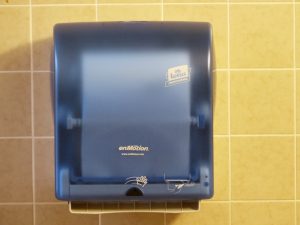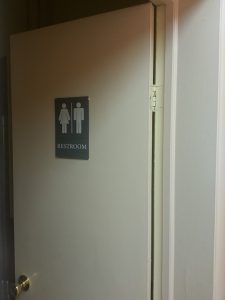This post has been written by Davina Richardson, Children’s Specialist Nurse at Bladder & Bowel UK.
Toilet training a child with autism is often difficult. Autism is a spectrum condition that affects social communication, social interaction and imagination. There are often sensory issues as well. These impact on many areas of learning and life for the child and their family.
Communication difficulties may mean that the young person with autism struggles to understand what is being asked of them. The problems with social interaction may mean they are not concerned about being wet or soiled, they may not be motivated to please their parents or carers and may not be able to learn through imitation of others.
Problems with public toilets

Problems with imagination may lead to a lack of ability to know what is going on or what will come next, resulting in inflexibility, difficulty changing routines, fears and anxieties, as well as an inability to transfer a skill learned in one place to another. Therefore, the child may be able to use the toilet at home or at school, but does not understand that they can or should do this in different toilets.
These problems may on their own make public toilets a difficult place for children and young people with autism to be. However, if there are sensory differences, particularly hypersensitivities, which is an increased awareness of different sensory inputs, these may make public toilets a particularly difficult or frightening place to be. It needs to be remembered that sensory problems can make things that most of us do not even notice intrusive or even painful for some people with autism.
Children who are sensitive to sounds and who struggle with imagination find echoing spaces with unpredictable banging of toilet doors, flushes and loud hand driers very difficult to deal with. Those who struggle with visual sensitivities may find flickering strip lights and reflective surfaces a problem. Smell can also be an issue, with odours from different people and strong cleaning materials. For children who are hypersensitive to touch and internal body feedback systems (interoception), colder environments may be distressing.
What can be done to help?

Introducing different toilets early in the toilet training process is usually a good idea, but not always achievable. Trying to understand what is causing the difficulty for the individual allows opportunities to consider what can be adjusted to improve things. If the problem is with understanding then picture cue cards and social stories can help.
Changing the environment is not usually possible with public toilets. However, many children and young people with autism are able to manage better if they have access to a disabled toilet. There are numerous locked toilets across the UK which can only be accessed with a RADAR key. These keys are available from Disability Rights. The idea behind the scheme was that disabled toilets would remain clean and available for those that needed them, rather than to the general public.
The advantage of a disabled toilet for children and young people with autism is that they are separate from main public toilets. This reduces sudden and unexpected noise, particularly from hand driers. There will be fewer smells, a more consistent layout and therefore what is behind the door is more predictable. There is also more space for a parent or carer to go in with them.
Introducing change

Introducing change gradually is also helpful. It would be a good idea to take the child who struggles with public toilets to the door of the disabled toilet, unlock it, have a quick look, point out something that is the same as at home or school and then leave. If this is done on every trip out, then gradually the young person will be persuaded to step into the toilet with the door left open, then to wash their hands and finally to sit on the toilet with the door closed. Use of picture cue cards and social stories may help.
As with all life skills for the child with autism, patience, consistency, a calm manner and unpicking the particular area of difficulty and finding a way to reduce the impact all help.
For more advice, information or support for toilet training a child with autism or to discuss any area of bladder or bowel problems or toileting issues for people of all ages and abilities visit our website, email us, or ring our helpline on 0161 214 4591.


Comments are closed